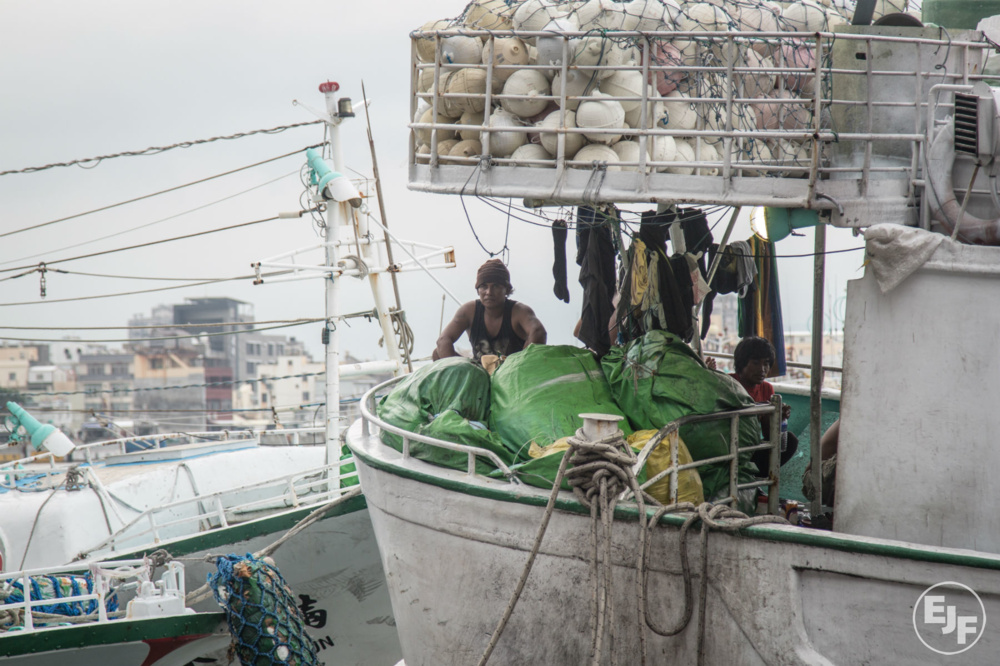
EJF in the field: Uncovering widespread slavery in Taiwan’s fisheries
“I know that a fisherman does not know much, and that’s why they can treat us badly and pay small salaries. No one tried to help us.” - victim of trafficking speaking at shelter in Taiwan
Taiwan is one of Asia’s most advanced economies.
It has one of the world’s most significant fishing fleets, with the world’s largest fleet of longline tuna vessels - supplying some of the world’s largest seafood companies - and a fishing industry worth some $3 billion annually.
But behind this thriving industry is a dark secret.
Taiwan’s fishing industry is plagued by illegal activities and fuelled by the systemic abuse of its workers.
Vulnerable fishers are trafficked from developing countries such as Indonesia and the Philippines, and trapped into an abusive system of exploitation and overwork onboard vessels fishing illegally in Taiwanese waters and beyond.
These illicit activities have not gone unnoticed. In recent years the rapid expansion of Taiwan’s tuna fleet and the lack of transparency within it has garnered international scrutiny.
In October 2015, the European Union gave Taiwan a “yellow card” warning for its lack of cooperation in the global fight against illegal fishing,while the US Trafficking in Persons report warned Taiwan’s seafood sector had a significant risk of trafficked workers.
And it’s not just distant water activities that are causing concern. Taiwan’s inshore fisheries have seen dramatic declines in productivity in recent decades. Along Taiwan’s northern coast, the number of fish species found in regular samples have dropped 75% in the last 30 years.
Yet inshore fishing efforts remain substantial, and in a similar trend to that witnessed by EJF in Thailand, unscrupulous companies and vessel operators are resorting to the exploitation of workers, and illegal fishing practices - including the targeting of vulnerable fish species such as sharks - to remain profitable.
Over the last year, EJF has visited ports and shelters in Taiwan, where we heard stories of violence, abuse and threats; of workers promised good wages and working conditions, but faced with squalid conditions and heavy financial deductions for food, travel, medical checks and accommodation; left working long hours, in unsafe and inhumane conditions, for little or no money.
Violence against workers is commonplace, while families back home are also often also a target, liable for workers’ debts if they flee.
The EU “yellow card” did trigger action in Taiwan, with the government revising its existing fishery law and improving control of its distant water fleet, but these efforts do not go far enough, particularly in improving conditions for migrant fishermen.
Illegal practices remain rife and migrant workers continue to be left at the mercy of unscrupulous brokers and captains, which threatens to undermine the positive steps made to tackle the challenges facing its fisheries.
Over the course of the next year, EJF will be expanding its presence in Taiwan.
We will work with local activists to continue to document human rights and environment issues facing the domestic fishing industry and similar issues facing its distant water fleet, where fish stocks remain under severe pressure and and similar issues facing its distant water fleet where workers have even less protection. We will share our findings and recommendations with Taiwanese authorities with the aim of producing constructive improvements.
In doing so, we will take another step towards our goal of eradicating illegal fishing and ending the environmental destruction and human rights abuses that continue blight fisheries in Taiwan and across the world.
SIGN UP FOR OUR EMAILS AND STAY UP TO DATE WITH EJF